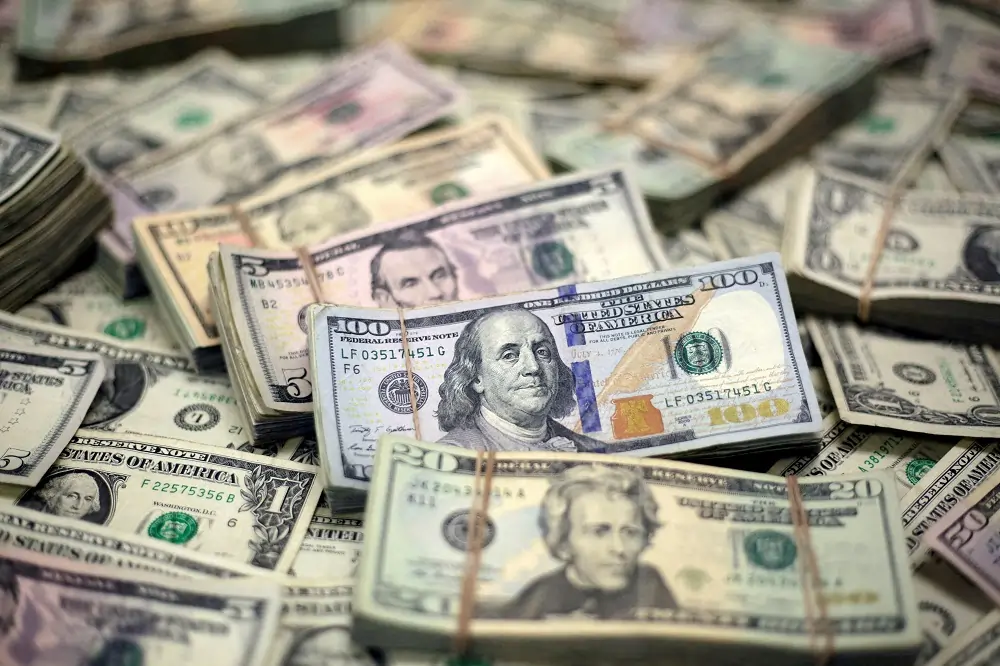
By Stefano Rebaudo
(Reuters) -The dollar edged down on Tuesday before U.S. inflation data and the televised U.S. presidential debate, which could affect expectations for the interest rate outlook.
A mixed labour report on Friday failed to make a clear-cut case for whether the Federal Reserve would deliver a regular 25 basis point (bps) rate cut or an outsized 50 bps one at its Sept. 17-18 policy meeting. Traders are now waiting on Wednesday’s U.S. consumer price index report.
Barclays strategists noted that the greenback typically weakened ahead of Fed easing cycles and tended to overestimate rate cuts during so-called soft economic landings. Still, they said, a large part of its move had probably already happened.
Investor focus will also be on the televised U.S. presidential debate later on Tuesday that could weigh heavily on the November election.
“Should a clear winner emerge from the debate, expect the forex market to start ‘front-loading’ positions it would have taken after the election result in November,” said Chris Turner, head of forex strategy at ING.
Investors see the greenback rising in the event of a Donald Trump victory, as tariffs might prop up the currency and higher fiscal spending could boost interest rates.
The dollar index, which measures the U.S. currency against six rivals, was at 101.62, down 0.03%.
Markets are currently fully pricing in a 25 bps cut from the Fed next week, with a 50 bps cut priced in at 30%, down from as high as 50% on Friday, the CME FedWatch tool showed.
For 2024, traders expect 110 bps of easing, up from around 100 bps, from the remaining three meetings.
Fed policymakers last week signalled they are ready to kick off a series of rate cuts, with Governor Christopher Waller saying he could support back-to-back cuts, or bigger cuts, if the data suggests the need.
Meanwhile, the euro was flat at $1.1034 after dropping nearly 0.5% on Monday.
Investors were watching Europe’s political backdrop, mentioning the stalemate in France and heightened uncertainty across the EU after German regional elections.
“The resilience of the euro this year can be partly explained by the region’s current account surplus and by the market’s nonchalance regarding the budget issues faced by various EU countries such as Italy and France,” said Jane Foley, senior forex strategist at Rabobank.
“However in the second half of the year fiscal policy will be more in focus and this could affect the single currency.”
Economists at Barclays expect political fragility to hinder fiscal adjustments in the euro area in 2024-2025.
The European Union needs massive investment if it wants to keep pace economically with rivals, former European Central Bank chief and Italian prime minister Mario Draghi said on Monday, before calling for new sources of common funding which countries led by Germany have been reluctant to agree to.
“In our view, these issues (raised by Draghi) should provide a cap on rallies on the euro/dollar going forward,” Rabobank’s Foley said.
The spotlight though will also be on the messaging from the ECB on Thursday after its policy meeting. Traders are pricing in 63 bps of easing this year from the ECB.
The dollar was up 0.15% at 143.42 yen, creeping away from the one-month low of 141.75 touched on Friday. The greenback fell 2.7% last week against the yen.
Analysts do not expect the Bank of Japan (BoJ) to raise rates or to provide decisive guidance on Friday next week.
“Current market conditions still look fragile and an unexpected BoJ rate hike after an anticipated, first Fed rate cut on 18 September would likely disrupt the market again, in our view,” said Masamichi Adachi, economist at UBS.
China’s yuan eased slightly on Tuesday, but losses were capped by better than expected export data. [CNY/]
Imports, however, missed forecasts and grew just 0.5%. That follows lower than expected inflation data published on Monday, highlighting still weak domestic demand.
The pound rose after UK data showed robust employment growth. It was last up 0.15% at $1.3094.
(Reporting by Stefano Rebaudo and Ankur Banerjee; Editing by Andrew Cawthorne and Mark Potter)


